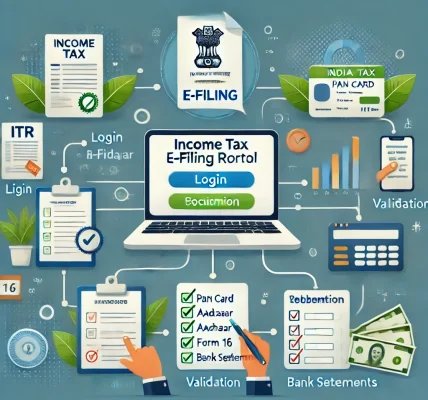Corporate tax laws in India are governed by the Income Tax Act, 1961, and various rules and regulations prescribed by the Ministry of Finance and the Central Board of Direct Taxes (CBDT). These laws are essential for businesses, as they dictate how corporations, partnerships, and other business entities are taxed on their income.
India’s corporate tax structure has undergone significant reforms in recent years, aiming to make the tax regime more transparent, simpler, and business-friendly. However, compliance with corporate tax laws is crucial for every business operating in India to avoid legal consequences.
This blog aims to provide businesses with an overview of the corporate tax laws in India, focusing on key provisions, tax rates, exemptions, deductions, and compliance requirements.
Understanding Corporate Tax in India
Corporate tax is the tax levied on the income earned by companies and corporations. It is a direct tax and is applied to both domestic and foreign businesses operating in India. The corporate tax rate varies depending on the type of company, its turnover, and the nature of its business activities.
1. Types of Corporate Entities in India
Before diving into the tax laws, it’s important to understand the different types of corporate entities in India. The tax provisions differ based on the type of company.
- Private Limited Companies: These are the most common type of corporate entities in India. They are required to pay taxes on their global income and must adhere to the corporate tax rate.
- Public Limited Companies: These companies, which are publicly traded, have a similar tax structure to private limited companies but are subject to more stringent compliance and disclosure requirements.
- Foreign Companies: Foreign companies operating in India are also subject to corporate tax, but the taxation is limited to their income earned within India.
- Limited Liability Partnerships (LLPs): LLPs are taxed differently, with the tax rate and compliance requirements varying from that of traditional companies.
Corporate Tax Rates in India
The Indian government periodically revises corporate tax rates to encourage investments and ease the tax burden on businesses. The following are the key corporate tax rates in India:
1. Domestic Companies
- Standard Tax Rate: For domestic companies, the tax rate is 30% on income, subject to certain deductions and exemptions.
- Small Companies: A domestic company with a turnover of up to ₹400 crore can avail a reduced tax rate of 25%.
- Startups: Newly established startups may be eligible for a reduced tax rate of 15% if they meet certain conditions.
2. Foreign Companies
- Tax Rate: Foreign companies are subject to a tax rate of 40% on their income earned in India.
- Branch Office of Foreign Companies: If a foreign company operates in India through a branch office, it will be taxed at the same rate of 40%.
3. Minimum Alternate Tax (MAT)
Minimum Alternate Tax is applicable to companies that have a large amount of deductions and exemptions, but their tax payable under the normal provisions is zero. In such cases, MAT ensures that companies pay at least a minimum amount of tax. The MAT rate is 15% on the book profits of the company.
Deductions and Exemptions under Corporate Tax Laws
Businesses in India are eligible for a range of deductions and exemptions under the Income Tax Act to reduce their tax liability. Some of the key deductions and exemptions include:
1. Deduction for Business Expenses
Business expenses such as salaries, rent, interest on loans, and operating costs can be deducted from the company’s income to reduce taxable income.
2. Depreciation
Companies can claim depreciation on fixed assets like machinery, buildings, and vehicles. Depreciation is a non-cash expense and helps in reducing taxable income over time.
3. Investment in Research and Development (R&D)
Companies that invest in R&D activities can claim deductions under Section 35 of the Income Tax Act. The benefit is available for both in-house research and external R&D expenditures.
4. Exemption for Startups
Startups registered with the government as recognized startups may be eligible for tax exemptions, including exemption from capital gains tax and income tax for a specified period.
Corporate Tax Compliance in India
Complying with corporate tax laws in India is a critical aspect of running a business. Non-compliance can lead to severe penalties and legal repercussions. Here are some essential compliance requirements for businesses:
1. Filing Tax Returns
Every business entity, including companies, LLPs, and foreign businesses, must file an income tax return annually. This must be done by the due date, which is usually July 31st of the assessment year, but can be extended based on the type of business and other factors.
2. Tax Audit
A tax audit is mandatory for companies whose turnover exceeds ₹1 crore (or ₹50 lakh for businesses under presumptive taxation) in a financial year. A certified auditor must conduct the tax audit, and the report must be submitted to the tax authorities before the filing of tax returns.
3. Transfer Pricing Compliance
Transfer pricing regulations apply to companies that have transactions with related foreign entities. Businesses must ensure that their pricing for cross-border transactions complies with the arm’s length principle. Transfer pricing documentation and disclosures must be submitted as per the regulations.
4. TDS (Tax Deducted at Source)
TDS is a method of tax collection at the source of income. Corporate entities must deduct tax on payments made to employees, contractors, and vendors, and remit the TDS to the government. TDS returns must be filed quarterly.
5. GST Registration and Compliance
Companies must also comply with the Goods and Services Tax (GST) provisions for the supply of goods and services. GST registration, filing returns, and maintaining records are essential for businesses engaged in taxable transactions.
Penalties for Non-Compliance with Corporate Tax Laws
Non-compliance with corporate tax laws in India can result in penalties, interest charges, and legal action. Here are some common penalties:
1. Penalties for Late Filing
Failure to file income tax returns on time can result in a penalty ranging from ₹1,000 to ₹10,000, depending on the delay. The penalty can be higher if the business fails to file within the extended deadline.
2. Penalties for Underreporting Income
If a business underreports its income, the tax authorities may impose a penalty of 50% to 200% of the underpaid tax, depending on the nature of the error.
3. Penalties for TDS Non-Compliance
Businesses that fail to deduct or remit TDS on time are subject to penalties. Interest of 1.5% per month is charged on the amount of tax due. Additionally, penalties can range from ₹10,000 to ₹1 lakh.
Recent Reforms and Changes in Corporate Tax Laws
The Indian government regularly introduces reforms to improve the ease of doing business and boost investments. Some of the notable changes in recent years include:
- Corporate Tax Rate Cuts: In 2019, the government reduced the corporate tax rate for domestic companies from 30% to 22%, and for new manufacturing companies, it was reduced to 15%.
- Tax on Digital Economy: India has also introduced measures to tax the digital economy, including equalization levy on e-commerce platforms and foreign digital services.
Conclusion
Understanding corporate tax laws is essential for businesses to stay compliant and avoid legal issues. The corporate tax regime in India is complex, with various provisions, exemptions, and compliance requirements. By staying informed and adhering to the tax laws, businesses can effectively manage their tax liabilities and contribute to India’s growing economy.
If you are unsure about any aspect of corporate taxation, it is advisable to consult a qualified tax professional or corporate lawyer who can provide personalized advice and ensure compliance with the legal framework.




